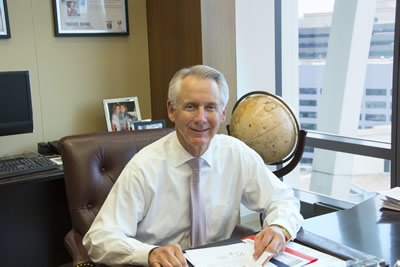To cap Infrastructure Week, during which business and labor groups staged rallies and public awareness events in Washington, D.C. and around the country, American Trucking Associations CEO and former two-term Kansas Governor Bill Graves weighed in on his members’ position regarding user fee collections, noting “The trucking industry contributes more than $16.5 billion to the Highway Trust Fund … but we’re willing to do more, to pay more at the pump [and] believe the fuel tax is the most efficient way of funding our critical needs, putting 98 percent of all revenue collected into actual construction.
|
|
| Bill Graves |
“We’re open to considering alternatives. However, those alternatives need to be efficient. Some alternatives, like tolling see 20, 25 or even 30 cents of every dollar collected siphoned off into administrative bureaucracy when those funds could be invested in actual project work. What’s most important is that our leaders put the Highway Trust Fund back onto a sustainable path into the future—a task they have so far failed to accomplish.
“For more than two decades our leaders in Washington have neglected our highways and their duty to maintain and improve our roads and bridges to give us the modern, efficient transportation system we deserve,” adds Graves in “Trucking Needs Better Roads to Keep Our Country Moving,” an opinion piece. “Since 1993, our leaders have failed to grow the federal highway program—failed to ensure that its core, the Highway Trust Fund, was stable and now we are seeing the impacts of that neglect. Congestion and bottlenecks on important freight corridors cost trucking more than $9.2 billion annually—costs that ultimately get rolled into prices consumers pay at the store. Dollars invested in reducing congestion and improving our highways ultimately save us all money.
“Since Congress last raised the tax on diesel and gasoline, the relative purchasing power—the amount of steel, concrete and asphalt we’re able to buy with our tax dollars—has dropped by almost 50 percent. In simpler terms, we’re getting half as much as we used to get for our money even as our needs and population grow.”
“There are no Republican bridges or Democratic highways, and there is agreement on both sides of the aisle that we must do something,” Graves observes. “Liberals and conservatives can, and have, come together on this issue, and we must meet them halfway by holding their colleagues’ feet to the fire and demanding they act. Pundits like to say that taxpayers and voters expect our elected leaders to lead, not hide from tough issues.
“What’s most important is that [they] put the Highway Trust Fund back on a sustainable path into the future, a task they have so far failed to accomplish. Congress has kicked the can down the road—a congested road marked with potholes, mind you—so often the can is dented beyond recognition … Infrastructure is a no-brainer. A highway bill will create jobs, improve our economy and strengthen America’s position as a global leader. We all need to demand that our representatives stop shirking their responsibility, step up, do their Constitutional duty and pass a comprehensive highway bill.”
Infrastructure Week (May 11-15) saw participation from 92 affiliate organizations and included 47 events held in Washington, D.C. and around the country. Eighty mayors participated in their home district, while 27, including New York City’s Bill De Blasio and Oklahoma City’s Mick Cornett, flew to Washington to convey their position on public works funding.
Throughout the week, infrastructure advocates, mayors, and state legislators held more than 300 meetings with Congressional offices and Obama administration officials about the need for long-term infrastructure investment.
